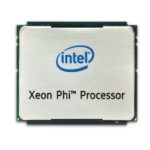The EPCC supercomputing centre at the University of Edinburgh has installed a prototype system developed by the NEXTGenIO project. Funded by the European Commission, NEXTGenIO is an R&D project tasked with developing solutions to high performance computing’s I/O and data challenges. “Our ongoing collaboration with NEXTGenIO allows us to develop solutions to speed up time-consuming I/O operations in HPC applications and workflows, leading to faster execution, less use of resources, and improved scalability,” said Trish Damkroger from Intel.
HPE Powers New Tesseract Supercomputer at EPCC
Over at EPCC, Professor Peter Boyle describes the new Tesseract supercomputer, which is hosted at EPCC’s Advanced Computing Facility. DiRAC is part of the UK’s e-infrastructure investment to improve computing, software development, data storage, networking and distributed computing networks. “Tesseract is an 844-node HPE SGI 8600 supercomputer. Each node has two Xeon scalable processor 4116 “Silver” nodes, and 96 GB of memory. In total, the new system has 20256 Intel Skylake computing cores, and is interconnected using 100 Gbit/s Intel Omnipath interconnect.”
Apply Now for the Summer of HPC in Edinburgh
Applications are now open for the PRACE Summer of HPC 2018. The Summer of HPC is a PRACE outreach and training program that offers summer placements at top HPC centers across Europe to late-stage undergraduates and early-stage postgraduate students. “Consisting of a training week and two months on placement at top HPC centers around Europe, the program offers participants the opportunity to learn and share more about PRACE and HPC, and includes accommodation, a stipend and travel.”
PRACE Offers Supercomputing 101 Course
PRACE is offering an online Supercomputing 101 course through the Future Learn program. This free online course will introduce you to what supercomputers are, how they are used and how we can exploit their full computational potential to make scientific breakthroughs. “Using supercomputers, we can now conduct virtual experiments that are impossible in the real world.”
Test Your Knowledge with the MPI Quiz
In this video, David Henty from EPCC conducts a video-based quiz on MPI. “The multiple-choice questions are partly designed for fun to test attendees’ knowledge, but are mainly aimed at promoting discussion about MPI and its usage in real applications. All that is assumed is a working knowledge of basic MPI functionality: send, receive, collectives, derived datatypes and non-blocking communications.”
DDN Adds Cost-Effective Data Protection to WOS Object Storage
Today DDN announced new feature enhancements to its WOS object storage platform that include increased data protection and multi-site connectivity options. With its newest capabilities, DDN WOS provides the lowest data protection overhead available in the market. It also delivers control for local-only rebuilds for higher uptime and lower performance impact of hardware failures, along with multi-site collaboration, distribution and disaster recovery that is faster and more efficient than public cloud solutions.
ExaFLOW Funds CFD Research for Exascale
The ExaFLOW project has announced 3.3 Million Euros of funding for a group of eight organizations to take Europe’s CFD community one step closer to performing simulations in exascale environments.
SGI Powers New Cirrus Supercomputer at EPCC
Businesses could dramatically cut the time taken to bring new products and services to market with help from a new SGI supercomputer at EPCC, the UK’s leading supercomputing center based at the University of Edinburgh. “This newly installed computing power – in tandem with EPCC’s in-house expertise – means we are well placed to help businesses meet many of the computational challenges associated with developing new products and services,” said George Graham, Commercial Manager of EPCC.
Video: Intel Xeon Phi (KNL) Processor Overview
Adrian Jackson from EPCC at the University of Edinburgh presented this tutorial to ARCHER users. “We have been working for a number of years on porting computational simulation applications to the KNC, with varying successes. We were keen to test this new processor with its promise of 3x serial performance compared to the KNC and 5x memory bandwidth over normal processors (using the high-bandwidth, MCDRAM, memory attached to the chip).”












